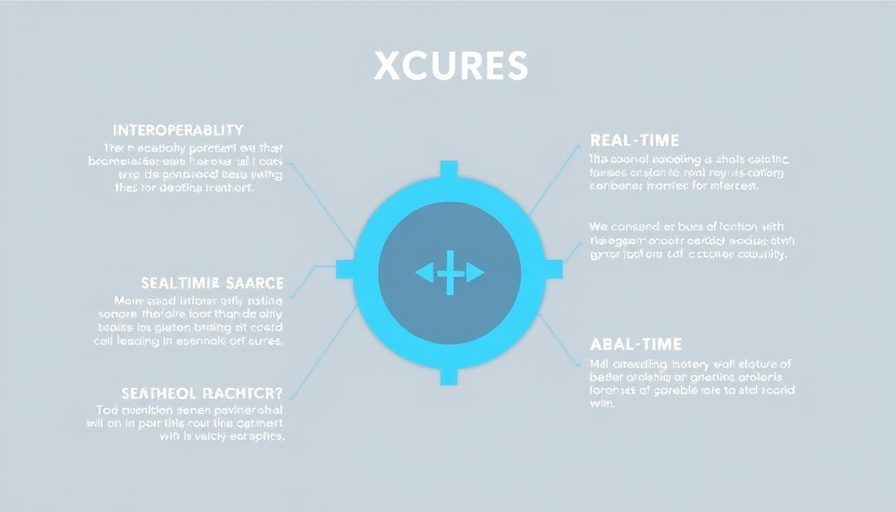
Revolutionizing Patient Data Access: xCures' New IAS Solution
xCures, a leader in AI-powered healthcare data solutions, recently announced the launch of its Individual Access Services (IAS), designed to enhance patient data accessibility within the framework of the Trusted Exchange Framework and Common Agreement (TEFCA). This important development marks a significant leap towards establishing a nationwide network that provides secure access to comprehensive and accurate medical records for patients and healthcare providers alike.
Why This Matters for Healthcare Practitioners
For concierge health practitioners, who prioritize personalized care, understanding the implications of xCures' innovative IAS solution is vital. It not only empowers healthcare providers to access crucial patient data swiftly but also strengthens the trust patients place in their healthcare journey. With the increasing complexity of healthcare tech, this platform offers a straightforward solution, reinforcing clinical decisions grounded in accurate information.
Integrating Key Technologies for Enhanced Security
The IAS solution incorporates advanced technologies to ensure a seamless data exchange process. Partnering with CLEAR, recognized for its secure identity verification services, xCures meets the National Institute of Standards and Technology's (NIST) Identity Assurance Level 2 (IAL2) standards. This means that patient information can be accessed securely and shared confidently among healthcare providers, minimizing the risk of data breaches and unauthorized access.
The Role of Kno2 in Data Retrieval
Through collaboration with Kno2, a Qualified Health Information Network (QHIN), xCures can efficiently query and retrieve patient data from an extensive network of healthcare organizations participating in TEFCA. This connection allows for timely and accurate information retrieval, proving essential in making informed decisions about patient care. For practitioners apprehensive about managing tech within their practices, relying on these trusted partnerships can simplify the experience.
Collaborative Connectivity with the Epic EHR System
Another cornerstone of xCures' IAS solution is its connectivity with the Epic electronic health record (EHR) system, one of the most widely used in the health sector. With this integration, practitioners can access patient history and treatment information, enhancing continuity of care. As healthcare continues to evolve, ensuring that your practice can leverage such integrative technologies is critical.
The Broader Impact on Patient Care
Mika Newton, CEO of xCures, expressed that this achievement not only represents a pivotal moment for xCures itself but serves as a breakthrough for patient care nationwide. The platform acts as a “universal adapter,” effectively linking to the health information backbone across the nation. This accessibility is especially crucial in urgent or emergency scenarios where complete patient records can significantly impact clinical outcomes.
Addressing Common Concerns About Tech Integration
Concierge practitioners often voice concerns surrounding the overwhelming nature of tech adoption in their practices. With xCures’ IAS solution, the complexity traditionally associated with patient data access is streamlined. By focusing on user-friendly designs and facilitating provider onboarding, this technology aims to alleviate the burden of integration, making it accessible even for those who feel overwhelmed by tech.
Looking Ahead: The Future of Patient Data Management
As healthcare continues to advance technologically, the necessity for effective and secure data management systems will only grow. Solutions like xCures are paving the way for a more connected healthcare environment. For concierge health practitioners considering a transition or upgrade in their data management strategies, embracing such innovations will be imperative for staying relevant and enhancing patient satisfaction.
Conclusion: A Call for Embracing Change
As we navigate the complex landscape of healthcare technology, the launch of xCures’ Individual Access Services represents an essential step towards a more integrated and efficient healthcare delivery system. For concierge practitioners seeking to grow their practice or solidify their community standing, this solution provides an invaluable tool for facilitating better patient outcomes. It's time to embrace these transformative technologies and enhance your practice’s capabilities.
Explore how the xCures IAS solution can benefit your practice and connect with your patients like never before!
 Add Row
Add Row  Add
Add 




Write A Comment